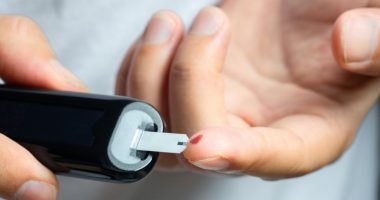Share this @internewscast.com
We’ve all seen how miraculous the results can be.
Ozempic and similar GLP-1 medications like Wegovy or Mounjaro have supercharged weight loss for millions.
While a small number suffer negative side effects from the jabs, which were originally intended to treat type 2 diabetes, the downside for most seems to come when they stop taking the medication.
We’ve all heard about the ‘food noise’ roaring back, the intense hunger cravings, the uncontrollable weight gain. It’s enough to scare anyone off putting down ‘the pen’.
Justine Martin, who lost 15kg (33lbs, or 2st 5lbs) on Mounjaro, previously told Daily Mail Australia she was apprehensive about coming off it.
‘The medication had ended my obsession with food that had controlled my life for as long as I could remember. And I was terrified of going back,’ she said.
After ceasing the medication due to side effects that had become intolerable, Justine was initially hopeful.
‘For two weeks, while the drug was still in my system, I foolishly believed I’d changed,’ she said.


Justine Martin lost 15kg (33lbs, or 2st 5lbs) on Mounjaro but needed to stop due to side effects. She reported the food noise coming back, gaining 2.5kg and her ‘resolve hanging by a thread’

Dr Harsh Sheth works with patients who are coming off weight loss jabs
‘I still wasn’t thinking about food. I could just about manage two scrambled eggs in the morning, some soup for lunch and a tiny portion of meat and vegetables in the evening.
‘But then the smell of a doughnut unravelled me.
‘The old me had returned, the me who’d eat a doughnut or three on the way home from the shops, then start browsing Uber Eats to see what I wanted for dinner.’
After regaining 2.5kg (5.5lbs) in a matter of weeks, Justine said: ‘I feel like my resolve is hanging by a thread.’
It’s a story Dr Harsh Sheth, a leading gastroenterologist with extensive experience managing patients through weight loss journeys, has heard many times before.
‘Many patients experience a significant shift in their appetite, metabolism and emotional well-being after coming off these medications and it is my job to counsel individuals through this transition,’ he says.
‘In my practice, I’ve observed that approximately 60 to 80 per cent of patients regain some or all of their lost weight within six to 12 months after discontinuing the injections, unless they have a solid lifestyle plan in place.’
According to Dr Sheth, this happens because the medication doesn’t just help people eat less – it also has a significant impact on brain signals that control hunger.


Journalist Melissa Hoyer lost nine kilos (20lbs or 1st 6lbs) on Ozempic. She has kept the weight off for a year by eating a protein-rich breakfast and exercising for 30 minutes every day
‘Once the drug is stopped, appetite hormones increase again, and people often start feeling hungry more often and sooner than before,’ Dr Sheth explains.
‘The body also tends to slow down metabolism after weight loss, making it easier to regain weight if the person goes back to their old eating or activity patterns.’
As well as metabolic and appetite changes, Dr Sheth reports seeing significant mood alterations in his patients who come off weight loss jabs.
‘Some patients feel frustrated, anxious or even defeated because they feel like they’ve lost control over their eating again. This emotional stress can trigger emotional eating or binge episodes,’ he says.
There’s one big mistake Dr Sheth sees patients making time and time again when coming off the jabs: stopping without a plan.
‘Many people don’t prepare for what comes after the medication, so they go back to old eating habits,’ he says.
Additionally, he notes patients who fail to adjust their food intake slowly, skip exercise and rely on willpower alone are the most likely to regain weight.
‘Without tracking food, support or structure, it’s easy to lose the progress you have made,’ Dr Sheth says.
Emotional factors are often a forgotten piece of the puzzle when it comes to ‘Ozempic rebound’, yet they play a significant role.
‘Stress or frustration after stopping medication can lead to mindless or comfort eating,’ he says.
So with metabolic, appetite and mood changes working against them, how can patients ensure they avoid regaining what they’ve lost?
Dr Sheth recommends filling up on protein and fibre, setting regular meal times and using a food journal to identify patterns like stress eating or late night snacking.
He also says it’s crucial to stay active, especially with strength training, and practise stress-relief routines such as walking, deep breathing or talking to someone.
It’s important not to neglect the behavioural side of things when coming off weight loss injections; it’s not just about metabolism and appetite.
Dr Sheth encourages patients to ‘pause and assess’ each time they eat.
‘Take a few minutes to ask: am I physically hungry or just bored or stressed?’ Dr Sheth recommends.
Habit stacking is another effective behavioural technique. ‘For example, if you already drink coffee in the morning, consider adding a 10-minute walk afterwards to establish a new habit,’ he says.
One of Dr Sheth’s patients, a 42-year-old woman who lost 16kg (35lbs or 2st 7lbs) in nine months, struggled when coming off the Ozempic – but with a high-protein diet, weekly strength training sessions and journaling about her hunger cues, has maintained her results for more than six months.
In April, journalist Melissa Hoyer documented her experience of coming off the medication, revealing she had managed to keep off the nine kilos (20lbs or 1st 6lbs) she had lost for an entire year.
‘How I’ve done it hasn’t exactly been rocket science. It was more just taking on board what I learnt and felt when I was on “The Pen” – the colloquial term for the weekly jabs – and I’ve just incorporated those practices into my everyday life,’ Melissa said.
Her tips for keeping the weight off included eating a protein-rich breakfast every morning, drinking plenty of water, exercising for 30 minutes a day and tracking her progress via her clothes, rather than the scales.
‘I have inadvertently started “mindful” eating practices,’ she explained.
‘Simply, do I really need that big UberEats order? To devour that entire packet of Mint Slice biscuits while bingeing a TV series? Need that ridiculously huge bowl of pasta or four pieces of toast? No, no, no and no.’
So, it is possible to avoid ‘Ozempic rebound’ if you put in the work – and keep it up.
‘Consistency matters more than perfection,’ Dr Sheth agrees. ‘Even small, steady habits make a big difference over time.’

















